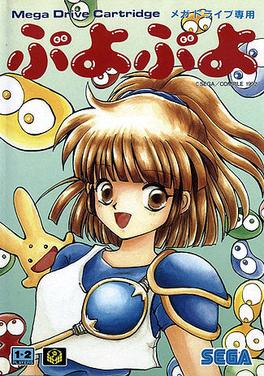
Puyo Puyo (ぷよぷよ) is a puzzle video game released in 1991 by Compile for the MSX2. Since its creation, it uses characters from Madō Monogatari. It was created by Masamitsu "Moo" Niitani, the founder of Compile, who was inspired by certain elements from the Tetris and Dr. Mario series of games.
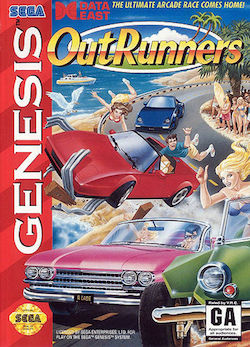
OutRunners is a 1993 racing video game developed by Sega AM1 on System 32 Multi hardware. It constitutes the third release in the arcade Out Run series, after Turbo OutRun (1989), and was ported to the Sega Genesis home console in 1994.

SegaSonic the Hedgehog is a 1993 arcade game in the Sonic the Hedgehog series by Sega. Controlling Sonic the Hedgehog and his friends Mighty the Armadillo and Ray the Flying Squirrel, the player must escape an island after they are kidnapped by the villain, Doctor Eggman. The game uses an isometric perspective. Players use a trackball to move the characters while dodging obstacles and collecting rings. The game was developed by Sega's arcade division, Sega AM3. It is one of four Sonic games with the SegaSonic name and was inspired by the 1984 game Marble Madness.

Derby Owners Club is a horse racing arcade game developed by Sega AM3, known as Hitmaker at the time, and published by Sega. Players are put into the roles of breeder, trainer, jockey, and owner of a thoroughbred racehorse. Statistics are saved on a IC card that can be put into any machine. The first version was released in Japan in 1999 and ran on the NAOMI arcade board.

World Club Champion Football is a Japanese collectible card game and football/soccer sports arcade video game released by Sega. The game is officially abbreviated as WCCF. It is the first arcade game to combine trading cards with a video game, establishing a new genre of arcade game. The game was mostly released in Japan and has never received a port.
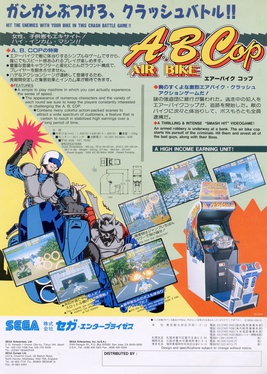
A.B. Cop is a futuristic 3D racing arcade game released by Sega in 1990. It never received any official port to home consoles.

Sega AM Research & Development No. 1 is a development department within Japanese toy and amusement game company Sega Fave that also previously existed as Wow Entertainment and Sega Wow Inc. AM1 spent most of its early existence under the leadership of Rikiya Nakagawa and developed a number of arcade games for Sega.

Sangokushi Taisen is a hybrid physical and digital collectible card game for the arcade, on the Chihiro arcade board. It is a real-time strategy-based game set in the Three Kingdoms period of Chinese history and the 14th century Chinese novel Romance of the Three Kingdoms by Luo Guanzhong. It uses the same housing as World Club Champion Football, with a sensitive playing area that can detect the position of the physical cards. Over 500 million trading cards have been shipped. It is the sixth trading card arcade game by Sega, following World Club Champion Football, Mushiking: The King of Beetles, The Key of Avalon, Love and Berry: Dress Up and Dance! and Quest of D.
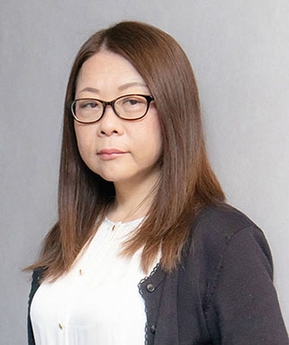
Rieko Kodama, also known as Phoenix Rie, was a Japanese video game artist, director, and producer employed by Sega from 1984 until her death. She is primarily known for her work on role-playing video games including the original Phantasy Star series, the 7th Dragon series, and Skies of Arcadia (2000). She is often recognized as one of the first successful women in the video game industry.
Hisao Oguchi is a Japanese business executive. He was director, vice chairman, and chief creative officer of Sega Sammy Holdings Inc. Oguchi originally was President and CEO of Sega. He was president and CEO of Sega Sammy Creation. He is currently a director of UDream, a content production company.

This is a list of development studios owned by Sega, a Japanese video game developer and publisher based in Tokyo, Japan. Accompanied with the list is their history of game development. Also included are the companies that Sega has acquired over the years. For a full list of games developed and published by Sega, see List of Sega video games, List of Sega mobile games and List of Sega arcade games.

F1 Exhaust Note is a two-player racing game released for arcades in 1991, modeled on Formula One racing. The game has a standard dual racing cabinet setup. Each player station has a 25-inch monitor, steering controls, shift controls, pedals, and a decorative seat. The sound originates from the back of the seat giving the player surround sound effect. The game ran on the Sega System 32 arcade hardware.
Arcade Archives is a series of emulated arcade games from the late 1970s, 1980s, 1990s, and early 2000s for PlayStation 4, Xbox One, Microsoft Windows, and Nintendo Switch, published by Hamster Corporation. A sub-series called ACA Neo Geo focuses on re-releasing Neo Geo titles in their original arcade format, unlike many services that attempt to emulate the console versions.

Ryu Ga Gotoku Studio is a video game developer housed within the Japanese video game company Sega as part of its Sega CS Research and Development No. 1 division. It is known for developing the games in the Like a Dragon series, which the studio is named after, since Yakuza 5.

Sega Net Mahjong MJ is a mahjong arcade game developed by Sega AM2 and released by Sega. The first version for arcades was released in July 2002 for the Sega NAOMI 2 arcade system. It featured online features with ranking, customization and recording your play history, using the experience that AM2 had developed from Virtua Fighter 4 and VF.NET. It received numerous updates and sequels since then.

Quest of D is an arcade game developed by Sega AM2 and published by Sega on the Chihiro arcade board. It is the fifth trading card arcade game by Sega, following World Club Champion Football, Mushiking: The King of Beetles, The Key of Avalon and Love and Berry: Dress Up and Dance!. It is an action-role playing game in a dark fantasy setting and is online enabled similar to previous AM2 titles Virtua Fighter 4 and Sega Network Taisen Mahjong MJ.

Shining Force Cross is an action role-playing game developed by Sega AM2 and published by Sega on the Sega RingEdge arcade platform. It is part of the Shining series from Sega. It is developed by the same development team as Quest of D. It was only released in Japan in arcades and received no port of any kind.
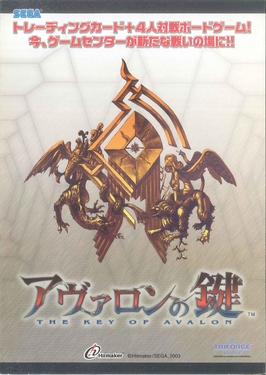
Avalon no Kagi, alternatively known as The Key of Avalon is an arcade game developed by Hitmaker and published by Sega on the Triforce arcade board. It is the third card arcade game by Sega, following World Club Champion Football and Mushiking: The King of Beetles. It is a combination of sugoroku style board game and combat trading card game. It was followed by a sequel called The Key of Avalon 2: Eutaxy Commandment which was updated as The Key of Avalon 2.5: War of the Key.
















